|
|
Contents: The Front Page | Fiction | Fantasy & Science Fiction | Children's | Nonfiction | Nostalgia | The Silent Three | The Four Marys Growing Up in the 1950s | Pen and Sword Books | Living with Skipper | Acker Bilk Album Sleeve Notes | The Back Page | Email 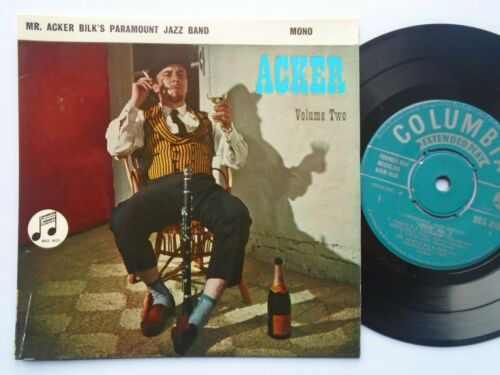 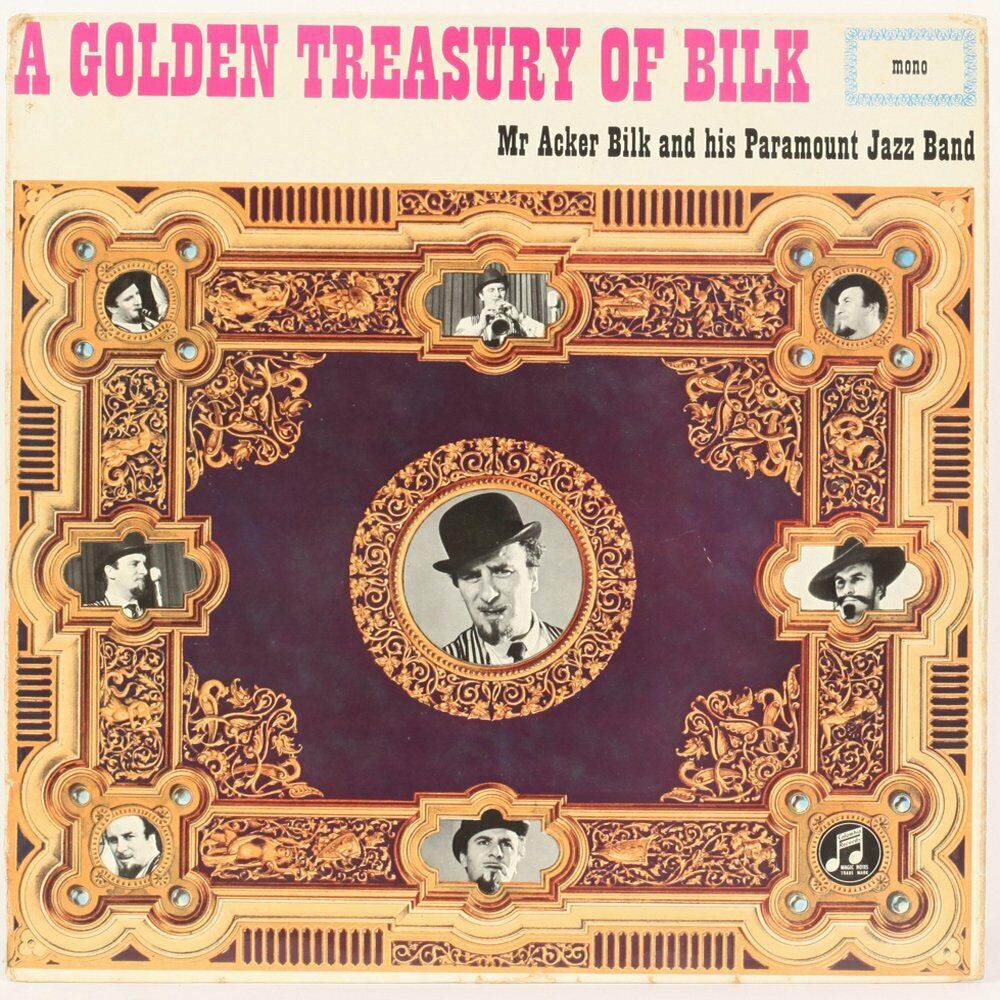 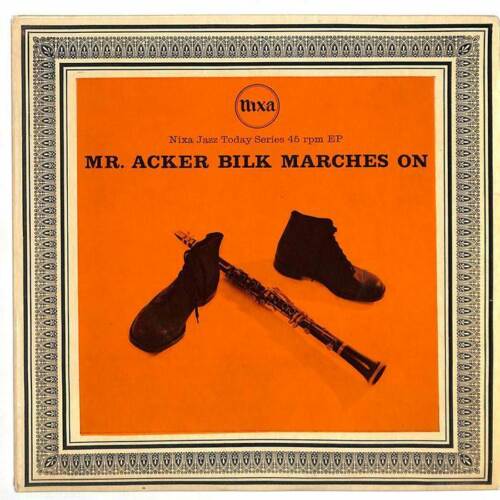 Brian Epstein reformed the Beatles... but first, there was Peter Leslie and Mr Acker Bilk! Updated October 28th 2021 - I had just about all of Acker Bilk's Gramophone Records and many more besides in my Collection. I followed Mr Acker Bilk around the West Country from 1960-1963. I had all of his Albums and divested myself of Them when new Audio Technology manifested Itself in the form of firstly, Cassettes, and secondly, CDs. I now own all the main Acker Bilk CDs that are available, but transference to CD, whilst enhancing the Quality of the Sound Reproduction, has omitted to reproduce the Sleeve Notes, although one of the CD reissues has a tribute to Peter Leslie and acknowledges this genius. I hope you enjoy reading the amazing Words compiled by Peter Leslie for Acker's album sleeve notes – his Idea it was to dress Acker and his players in smart, fancy Waistcoats and Bowler Hats. It was an act of Genius, matched only by his Genius with Words. I still have my Copy of The Book of Bilk, by the way, bought for me as a Christmas present in 1962 by my Sister, Jean (who sadly died this year from Cancer - she was the very best Sister a Boy could ever have had). It, too, is a Work of Genius, and I will never part with it. What makes it even more precious is that it is inscribed by Jean...
Around the beginning of the 1950s, Acker Bilk and his Paramount Jazz Band were booked by his Agent for a six-week Stint in Dusseldorf (sound familiar?), following which Acker engaged an up and coming thriller Writer, Peter Leslie, to give him and the Band a Makeover. Leslie came up with the Idea of striped Waistcoats and Bowler Hats, and at the same Time started to write the Band's LP and EP sleeve Notes in a kind of mock Victorian Style. It was a visionary Move, because the band became far and away the most successful of the "Trad" Jazz bands of the late Fifties and early Sixties. I have most of the LPs as CDs now, but I've managed to collect some of the LPs I had as a young Teen. I shan't rest until I have them All transcribed on this Page for Eternity (or at least until my Demise). They are worthy of such Treatment, in my Opinion. This month (November 2021) I have added the Album The Mr Acker Bilk Omnibus, his last Album recorded on the Pye Jazz Label, and almost certainly the first Album with Sleeve Notes by Mr Peter Leslie.
UPDATE 26th October 2021: Just to
let you know, I have managed to find three more albums with Peter
Leslie sleeve
notes which I shall be including in the December issue of Books
Monthly. I'm not sure
there are any more to be had, but I do keep finding albums, (some of
which I never owned, and which are compilations of material recorded by
Acker in the 1950s/60s) which contain tunes I have never heard Acker
perform before. My CD count at the moment is ten, with two more on the
way this weekend. My vinyl collection comprises two LPs and two EPs. I
am now on the hunt for memorabilia such as concert programmes etc., as
these also often contained notes compiled by Peter Leslie. The two
concerts I attended at Cheltenham Town Hall had just such concert
programmes, and I wish I had kept mine! If anyone reading this page
should happen to have such memorabilia and wouldn't mind photocopying
or photographing anything like the notes I have just mentioned, I would
be more than pleased to include them on this page! For information on THE
BOOK OF BILK, skip here to the bottom of this
page... New this month: November 2021
ACKER
Volume 2 (added 5/11/2021) Mr Acker Bilk's Paramount Jazz Band There’s
A Rainbow Round My Shoulder (Rose-Jolson-Dreyer)(a) Lazy
River (Carmichael-Aredin)(b)(Vocal: Mr Acker Bilk) Mr Acker Bilk (Clarionet and Master Mind); Mr Kenneth Sims (Trumpet); Mr Jonathan Mortimer (Trombone); Mr Ronald McKay (Tambours, Traps & Effects); Mr Ernest Price (Double Bass); Mr Roy James (Tenor Banjo) (a) Recorded 7.4.60 (b) Recorded 5.4.60 Recording First Published 1960 Recording
Engineer: Philip Clarke Mr Acker Bilk in expressing the firm and pious Hope that the Listener has enjoyed, read, learned, inwardly digested and indeed, profited from the gentle Ballads performed hereon, begs leave to draw the Attention of the Same to Others of his Works obtainable under the same Distinguished Trade Mark, viz:- Discs designed to revolve at a Speed of Thirty-three and one-Third Revolutions the Minute and of one Dozen inches Diameter: The Seven Ages of Acker (33SX 1205); Acker (33SX 1248 mono; SCX3321 stereo); A Golden Treasury of Bilk (33SX 1304 mono; SCX 3366 stereo); Clarinet Jamboree (part only)(33SX1204) The Same, restricted to a Diameter of but ten Inches: The Noble Art of Mr Acker Bilk (33S 1141) Discs designed to revolve at no less than 45 Revolutions the Minute, yet possessing a Diameter of no more than seven inches: Acker’s Away! (SEG 7904); The Seven Ages of Acker Volume One (SEG 8029); The Seven Ages of Acker Volume Two (SEG 8076); Acker - Volume One (SEG 8089)
A
Golden Treasury of Bilk (added 5/11/2021) Mr Acker Bilk and his Paramount Jazz Band
Upon Side the First Should
I? (Brown) Buona
Sera (Sigman and De Rose)(Vocal Refrain: Mr Acker Bilk)
Those Performing Mr Acker Bilk (Clarionet and Master Mind); Mr Colin Smith (Trumpet); Mr Jonathan Mortimer (Trombone); Mr Stanley Greig (Pianoforte); Mr Ronald McKay (Traps, Effects and Vocal Refrain); Mr Ernest Price (Double Bass); Mr Roy James (Tenor Banjo) The Performance recorded upon the 9th and 10th days of August, the 14th day of September, and the 4th day of October in the Year of Grace Nineteen Hundred and Sixty Recording
Engineers: Messrs Philip Clarke and David Sidi (Sic) I
met a Sideman from an antique Band At
Scunthorpe when the Take was poor Then
Scunthorpe told a different tale, Trumpet
and Trombone blared the Call The
bouncer thrusts his shoulder to the door, Now
blow the yammering hoorays in their Sprites, In
Zummerset did Dave and Frank ODE TO A CRITIC Hail
to thee, blithe Critic! British
Jazz (romantic!) Ack
has not anything to blow more fair; The
combo shows its paces; eyeballs, hair, Toady!
Toady” That I might At
home; on distant one-night stands;
Like
what can ail thee, Constable, O
what can ail thee, Constable! Dad,
what can ail thee, Constable, No
cars are left where none may park; With deepest apologies to Messrs Blake, Campbell, Coleridge, Gray, Keats, Shelley and Wordworth.
NIXA JAZZ TODAY SERIES
Side 1 (a)
Blaze Away (Holzman) (a)
El Abanico (Javaloyes) (Recorded 21.7.58) Sleeve
design: Ian Bradbury Mr
Acker Bilk’s Preliminary Skirmish in his Onslaught on the Agog Ears of
a Delighted and Admiring Publick took the Form of the Issue of a
Phonograph Recording designed to revolve
at a Speed of Thirtythree and One Third Revolutions the Minute, and
entitled Mr Acker Bilk Requests.” Scarce had the resounding Concussions
of this Opening Fanfaronnade died away, however - so Gratifying were
the Shouts
of Acclaim, so Loud the Protestations of Esteem - than the Redoubtable
West Countryman was obliged once more to re-form his Jolly Cohorts in
preparation for a Second Encounter. Accordingly,
still engagingly beneath the Banner of the Purist League, the six
Capital Fellows comprising Mr Bilk’s Justly Celebrated Ensemble fell in
at the Stentorian Command
of their Leader and moved off in Good Order, with Cornet, with Fife and
Drum, in the Direction of the Phonograph Recording Manufactory; there
to engage Mellifluously yet with Proper Regard for Rhythmic
Stimulation, in the
Creation of a Worthy Successor to their Initial Salvo. Here - in the
First of what promises to be an Entertaining and Instructive Series -
Mr Bilk and his Men tussle with a Quartet of Martial Tunes. In the Elegant Style which has brought them Renown throughout the Civilised World, and Parts (as they say) of Soho, this Melodic Fusillade opens with a Stirring Rendition of the March, Blaze Away. Hotfoot on the closing strains of this, there erupts a Galvanic Performance of the Prussian Favourite Under The Double Eagle; A Military Jingle from the Nimble Pen of a Herr Wagner which will not remain Unrecognised by those who Patronise the Searchlight Tattoo. By an Adroit manoeuver Southwards to the Spanish Isthmus, Mr Bilk infuses a tropical air into his Campaign by the use of the March called, in their Lingo, El Abanico, and the Volley terminates, in a Well-Aimed Thrust from the Mother Country, with C R E March - these Many Years the Unofficial Battle Cry of Her Majesty’s Corps of Royal Engineers, from which Patriotic and Workmanlike Body derives the Initial Nomenclature alluded to in the Title.
The
genius of Peter Leslie: The Mr Acker Bilk Omnibus: Pye Jazz Today Series
Side One
Those Performing Those concerned with Production In
the Space of Time which has elapsed since first the Incandescent
Brillance of the Genius of Mr Acker Bilk burst like a Display of St
Catherine's Fire on a Traditional Music World illumined previously only
by the Fitful Flickering of Lesser Talents, a growing Clamour has been
descried from among the Serried Ranks of his Loyal Devotees. It is for
the Issue of a Handy Compendium encompassing each Aspect of the Art of
Mr Acker Bilk displayed separately in the Initial Triumvirate of
Phonographic Recordings bearing his Name. Accordingly, in the Dozen
Melodic Delicacies here Assembled, can be found Representation from
these three Categories: Part the First derives from Mr Acker Bilk's Splendid Phonographic Debut; a Recording designed to revolve at a Speed of no less than Thirtythree and One Third Revolutions the Minute and entitled "Mr Acker Bilk Requests". The Quartet of Agreeable Jingles comprising this Succulent Abstract arrange Themselves as follows, viz:- (1) that Syncopated Masterpiece, "The Gladiolus Rag"; (2) a Rhythmic Celebration of the Charms of "Dardanella"; (3) A Performance as Spirited as it is Authentic of the Traditional Ballad, "The Franklin Street Blues; Fourthly (and Lastly) a Soul-Searing Rendition of "The Travelling Blues", the Same being well chosen in View of that which occurred thereafter. For so Gratifying were the Shouts of Acclaim, so loud the Protestations of Esteem which greeted the Impingement of Mr Bilk's first Essay that he had purpose to voyage speedily to the Recording Manufactory, there to consider his Second Task. This done, and the Die Cast, the Redoubtable Westcountryman caused it to become known that his Choice had fallen upon the Exercise of his Prodigious Laryngeal Dexterity. He was decided to sing. Thus it befell that the Genial Bristol Blower committed to Memory the Words and Music of those Ditties he felt inclined to Carol, insert his Head and Shoulders within the Larger End of the Recording Horn and give his Best, what Time the Paramount Jazz Men achieved a Seemly Display of Virtuosity in his Aid. First commemorating in Stentorian Fashion the Attributes of the State Endemic to his Music, the Egregious Mr B then passes to the Glottal Exploration of a Trio of Tunes as much Distinguished for their Originality of Approach as for their Catholicity of Source. Of these, "Higher Ground" and "Carry Me Back" are Negro Plantation Songs, while "Jump In The Line" was originally a Calypso from the Facile Noddle of Mr "Blind" Blake - a Celebrated Minstrel who had worked in the Caribbean Isles which produced this Strange Idiom. Scarce had the Agog Ears of an Admiring Publick recovered from the Resounding Concussions of this Second Fanfaronnade, however, than our Congregation of Sonic Adventurers and its Captain were again obliged to re-form in Preparation for yet a Third Encounter - this Time to engage Mellifluously yet wiith Proper Regard for Rhythmic Stimulance in a Tussle with a Quartet of Martial Tunes. This
Melodic Fusillade erupts (to commence the Third Salvo in our Magazine)
with a Stirring Assault upon the March, "Blaze Away". Hot Foot upon the
Closing Strains of this, there exsufflates a Dynamic Enactment of the
Transatlantic Favourite "Under The Double Eagle"; a Military Air from
the Nimble Pen of Herr Wagner which will not long remain Unrecognised
by those who patronize the Searchlight Tattoo. By an Adroit Manoeuvre
Southwards to the Spanish Isthmus our Hero infuses a Tropical Aspect
into his Campaign by the Use of the March called, in their Lingo, "El
Abanico", and the Volley terminates, in a Well-Aimed Thrust from the
Mother Country, with "C.R.E. March" - these Many Years the Unofficial
Battle Cry of Her Majesty's Corps of Royal Engineers from which
Patriotic and Workmanlike Body derives the Initial Nomenclature alluded
to in the Title.
Added
March 2021 The
genius of Peter Leslie: Mr Acker Bilk's Lansdowne Folio
Side One
Those Performing Those concerned with Production Though gargantuan the Task must appear to the Tyro, it must nevertheless be attempted: to essay definitively to evaluate the well-nigh gigantic Contribution to the Welfare of the melodious Muse achieved by MR ACKER BILK and those most admirable Complements to his Genius, the Members of THE PARAMOUNT JAZZ BAND. Suffice it, however, to record here merely that this agnate crew have together scaled the glittering Heights whereon dwell the Giant Success and his Handmaiden, the Lady Fame. Not once, not twice, but thrice have these be-laurelled Gentlemen sallied forth into the Lists, there to contest with cheaper, less worthy Opponents for the Publick's Crown of Acclaim; and three Times too, have they emerged victorious, with the Ballad celebrating the doughty Leader's own West Country County of Birth, with a dulcet rondo playing elegant Tribute (upon the reverse Side of the Kingdom) to the Prodigal's first, and last, View of his Motherland and-redolent of the Breeding and Manners for which Mr B's Compatriots are renowned the Globe over - with a fetching Madrigal bidding Good Morrow to a Lady of Latin Descent. And with each Success, planting the Standard of Jazz Music firmly atop the vasty Peaks and desolate Wastes of popular Song, they raise anew a different Emblem: the Standard of Appreciation of Those whose Taste had previously aspired to Nothing better than the Banal, the Trite and the Meretricious. Small Wonder, then, that from the four Corners of the Empire there ring ever and anew the Shouts and Acclaim, the Gasps of Surprise and Protestations of Satisfaction and Amaze at the prodigious Exploits of (to name them All: Mr Acker Bilk himself, vociferating and wielding the Clarionet; Mr Ronald McKay, as dexterous laryngeally as he is with the padded Beater and the Cymbal Stick; Mr Colin Smith, a Tower of Strength in the Brass Department and, with his fellow Mummer, Mr Jonathan Mortimer of Trombone Fame, a big Gun of the comical Arsenal of the Ensemble; Mr Stanley Greig, the original northern Light and Displayer of Pyrotechnics at the Keyboard; Mr Ernest Price, the scholarly Basher of the Bass; and Mr Roy James, whose Evocations from the Tenor Banjo bid fair to oust from popular Esteem the Pipes of Pan). This tempestuous Amalgam of Expertise and Enthusiasm has now succeeded yet again in capturing the popular Fancy with a Gothick Trifle entitled "That Is My Home", (the which, coincidentally, may be discovered by those of shrewd Intellect upon this very Recording). It was therefore deemed Timely that those innumerable Persons to whose Huzzahs Mr Bilk's Success is in no small Measure due, should be accorded the Privilege of having revealed to them a further Selection of those airy Ballads from his vasty Repertoire which "Age cannot wither nor Custom stale". And that, in a convenient circular Form, is what lies within this Envelope today. Added
March 2021 The
genius of Peter Leslie: Mr Acker Bilk and His Paramount Jazz Band: Beau
Jazz
Upon Side the First
Those Performing (b) Mr Greig and Mr McKay alone perform (c) Messrs Greig and James only - the latter adopting a Guitar (d) Mr Bilk and Mr McKay absent themselves from the band (e) The band play as
Supernumerary to
Monsieur Per Hansen Recorded on the 23rd June and 14th July 1962 Those concerned with Production It
would scarce seem required that the Writer should (inform) before the
very Eyes, either of the Initiate or of the Jazz Type, the vasty
Catalogue of Business attending the Herculean Labours of Mr Acker Bilk:
the Awards and Honours with which He has been profusely showered speak
for Themselves. It might be prudent natheless, to recall the Fact that
between the Issue of his last Album of Jazz Fancies and that which
these poor Notes accompany, He has achieved a singular Esteem in a
differing Field, that of the solo Clarionet with the String Ensemble.
And to emphasise that, with the Collection hereby enclosed, he and his
Paramount Jazz Band (whom you may decry depicted below), in the art of
Concentration required for the Production of a Symposium as varied and
as balanced, once again tread the well-loved Paths which lead from New
Orleans with Brilliance and Fervour undimmed. With Talent as immaculate
and with Genius as replete. Here are Favourites from the agile Pens of
Messrs J R Morton, Palmer, Prima, Yancey and Ellington; original
Trifles from Mr Colin Smith (Wilbur), Mr James (This Town), and Mr
Mortimer (Bula Bula). Stentorian Songs from Mr Bilk Himself to the
Number of Three; a Pair of intimate Duos featuring Mr Greig with Mr
McKay and Mr James, and a galvanic Performance of Mr Handy's Ole Miss
Rag which introduces Monsieur Per Hansen from the Continent of Europe,
a Trumpeter of Merit. (Transcribing this one was a real Labour of Love. The image I managed to find of the album cover was small and very badly photographed. Although I was able to blow it up using specialist software, it meant that some of the words were completely illegible. In some cases I used my knowledge of Peter Leslie's way with words, in others I simply guessed and it seemed to make sense. There may be errors in the above transcript, but the gist of the text is correct. If I happen to come across a copy of this album when the car boot sales start up again, I will make any corrections that are necessary.) Added March 2021 The
genius of Peter Leslie: Mr Acker Bilk and His Paramount Jazz Band: Call
Me Mister
Upon Side the First
Those Performing Production of the Work Ever more brightly gleam the ascendant Stars of Mr Acker Bilk and his Paramount Jazz Band. Laurels, Crowns, glittering Trophies shower upon their modest Crania; they are huzzahed in Hamburg, demanded in Denmark, asked for in the Antipodes! Palms in Cathay and other Parts of the Orient, customarily housed in inscrutable Sleeves, smart from the Effort of Applause! The
Leader Himself, never more sensible of the Necessity for Development
when perched atop the Pinnacle of Fame, has explored Avenues of
Endeavour complimentary to that followed by his Jazz Band to such good
Effect that his Performances with a String Orchestra are spoken of with
Breath bated throughout the Globe. So succesful indeed, both in the Old
World and upon the less civilized side of the Atlantic Ocean, have been
his Phonograph Cylinders in the Bazaars and Market Places, in this
Contest he has been Elevated from plain Mr. to the Style and Title of
Esquire. His Heart - that sturdy West Country Pumping Station! - remains nevertheless with the simple unfettered New Orleans Music which first lilted Him along the Road to the Top. And as an Earnest of this Bouleversement to the Roots, he now celebrates his Return and consolidates his Position with the Oeuvre under your Hand and the warm, sincere legend: Call Me Mister. With His truly remarkable Cohorts, he embarks here upon a lyric Voyage veering ever more frequently toward the Gaiety and License of those humid and tropic Regions where once the Infant Jazz was born. From Honky Tonk Town going South on the sunny Side to the Home of Baby Brown, this epic Crew finally reaches the calypsic Isles with Trinidad Dad, as penned by that staunch Composer, Mr Colin Smith. And after That, of course, it is (as the Leader Himself says in his superbly gravelled Tones), Manana, Pasado, Manana! (What we have been unable to ascertain, however, is whether Black Label Blues laments the Passing of an ancien regime phonographical Manufactory or the Absence of cogent Distillate in a Vessel formerly containing Caledonian Spirits). Added March 2021 The
genius of Peter Leslie: Mr Acker Bilk Requests Part One(*)
Side One
Personnel Those concerned with Production The discerning Enthusiast for Phonograph Recordings will not be slow to descry, among the Jingles performed hereon by Mr Acker Bilk and His Paramount Jazz Band a certain Portion of Airs particularly associated with the formative Years of that Music which Mr Bilk favours with his elegant Interpretations. That this is more than a lively Coincidence may at once be judged a Fact by All acquainted with the History of the Music on this Portion of the Atlantic Seaboard. For, as any Amateur of the Idiom well knows, recent Years have shown a Tendency, regrettably on the Increase for all those Bands, formerly peculiarly associated with that Branch of the Art dubbed Traditional to progress (as far as the Matter of Style be concerned) in a Fashion that cannot escape Comparison with those prevailing in the Present. To such an Extent had this Trend developed before the Advent of Mr Acker Bilk that there remained but a single Thing common to the Majority of Aggregations purporting to purvey Traditional Jazz, viz: that the sole Factor Traditional to these Assemblages of musical Talent was their Propensity for performing in the modern Manner! Into such a vexatiously tainted Arena the warranted Archaisms of Mr Bilk and His Lads drop as singularly welcome Christians among the Lions of Modernism (the Curse of the Age). This - it would be Idle to deny - is a Jolly Crew of Fellows dedicated to the Loyal Continuance of the Jazz Craft as laid down by the Masters Four Decades since in the City of New Orleans. Within
this Franework the Individuality of the Orchestra here flourishes. As
has been said by no less a Personage as Mr Bilk Himself (A Man of few
Words and Great Integrity): "We aim to play a Working Man's Music,
applying the Approach and Standards of the Crescent City Pioneers to
any Ditty we consider suitable as a Vehicle for the Talents of the
Band." The Four Works here incised are as vehicularly suitable as They
are impeccably performed. (*) Peter
Leslie is not credited on this album, but I am confident of it being
his work. The album was part of the Pye Jazz Today series and it was
shortly after this that Leslie was engaged as Acker's publicist. Added March 2021 The
genius of Peter Leslie: Mr Acker Bilk Requests Part Two(*)
Side One
Personnel Those concerned with Production Glum
would be of Countenance who could resist the Irrepressibly Majestic
Effect of a Blues Song; A Dullard the Man who failed to be stirred by a
lively March; a Simpleton the Oaf who could not appreciate the Cadences
of a Ragtime Speciality or the Sonorous Beauties of One of the more
dignified Dance Measures - as Performed by Mr Acker Bilk and
His
Paramount Jazz Band. Indeed, the Versatility of this rousing Crew (now
firmly ensconced as Standard Bearers atop the Bastion of Traditional
Music in these Isles) - cannot but Command the most Felicitous
Expressions of Esteem from all Quarters of the Compass. Mr Bilk, a
Taciturn Stalwart reared in the Welch Border Country, vacated the
Clarinettist's Throne in the Combination ably led by Mr K Colyer some
Four Years since to depart to his Native City, Bristol, in which
Well-favoured Pleasaunce he developed the Nucleus of his Present Band.
This Brotherhood of Blowers and Bashers so delighted the West Country
Swells, through the Media of Wireless Telegraphy, the Electrified
Loud-hailer, the Concert Hall and other Venues too numerous to mention
- that a move to the Metropolis was deemed Inevitable - since which
Sally Eastwards the Outfit has piled One Success deservedly upon
another. Withal,
not the least Meritorious of the Honours accruing to the Egregious Mr B
has the Distinction of being the first English Jazz Band to delight the
Ears of the Burghers of Poland - a Task so Easily Executed by Mr Bilk
and His Henchmen that Applause rang freely from Each Corner of the
Continent. Again, before the Tide of Popularity which swept them to its
Zenith in England had fully reached the Flood, these Extempore Paragons
had startled a great Shout of Acclaim from the Teutons during a
Six-week Residency at the acclaimed New Orleans Beer Bar in the
Township of Dusseldorf. As to how much of Success attends upon the Band in the Execution of its Aims, suffice it to Abstract a single Fact from the Record of its Sojourn in the German City . During the Two and Forty Days of the Season (it is computed by Mr R McKay, the Functionary who attends to the Percussion Traps besides acting as the Statistician of the Group), Delighted Enthusiasts expressed their Heartfelt Appreciation by despatching Attendants to the Rostrum bearing no less than Eleven Score and Two Tankards of German Ale, Six and Eighty Beakers of Schnapps and Three Bottles of Champagne Wine! (*) Peter Leslie is not credited on this album, but I am confident of it being his work. The album was part of the Pye Jazz Today series and it was shortly after this that Leslie was engaged as Acker's publicist. Added
March 2021 The
genius of Peter Leslie: A Taste of Honey (plus other Succulent and
Tasty morsels as tastily purveyed by) Acker Bilk Esquire (ably assisted
by the genius of Mr Leon Young and his Celebrated String Chorale)
Upon Side The First
Added
January 2021 The
genius of Peter Leslie: The Seven Ages of Acker
Side One
Personnel Familiars of the gigantic Talent which sits so lightly on the wide Shoulders of Mr Acker Bilk will not feign Surprise on learning that this Tower of Enlightenement, this very Paragon of musicological Expertise, betrays a Modesty varying directly as his Success. "It would ill befit the Purveyor of a Music so eclectic as our own", quoth Mr Bilk in a recent Conversation, "to claim boastfully any Prestige for its Excellence. Equally it would be a Thing ignoble indeed for the Speaker", Scion of an Hundred Generations of Men of Repute - personally to attach to Himself any Vainglory reflecting from such Competence as he may possess." The extempore Polyphony, or "Jazz", so ably blown, plucked, bashed and thumped by Mr Bilk and his Henchmenis a Polyglot, Music comprehending from Strains from many a different Host. Much the same (not to place to fine a Point on it) may be exerted with Regard to the Leader Himself. Accordingly, it has been Mr Bilk's Pleasure to indulge the present Collection in an agreeable and felicitous Conceit whereby he celebrates at one and the same Time both the more illustrious of his own Forebears and those most dominant Aspects of the Music he so fittingly represents. Thus - if the Writer be allowed to venture a Comparison with the "Seven Ages of Man" defined by Another in the same Trade - a like Number of Facets of the Jass Music and Ancestors of Mr Bilk may allusively be described among the Jingles presented herewith - Hence the Negro Spiritual whence derives the Soulfulness expressed upon the Countenance of Jass, properly has (as befits the earliest chronologic Feature of the Music) in close Fortuity with the Recollection of the Bilkdown Man, knuckling his Way out from the Mists of Antiquity into the Dawn of History - with a rare Eye for the Suitable, our Hero commemorates this archetypal Bilk - Pithecanthropus Ackerectus, to give him his zoological Nomenclature - with the Spiritual "I'm Going Home". The second Age, in this Instance, brings to Prominence the first Warrior Bilk, the Greek Ackermemnon, appositely recalled by a Brace of Marches (themselves second in the genealogical Line of Jass Origins). For these Mr Bilk has chosen two of the best-known Brass Band Tunes beloved of the Teutons. "The Gay Hussar" and "Old Comrades". The Deeds of Baron Acre de Bilk would have shone with greater Splendour on the Pages of History had it not been for an inclement Squall off the Coast of Ushant, which put paid to his Essay at the Invasion of England in 1065. His dismasted Vessel eventually foundered on a Rock in the Bay of Biscay, where all Hands perished miserably, this leading to the Expression, common in Medieval Times, that "his Barque was worse than his Bight." Appropriately, his place in the Bilkian Hierarchy is paralleled in the Development of Jass by the Blues. The Title - and it was not idly chosen - is "Lucky Rock", a Ditty much favoured in her Heyday by the late Ma Rainey. That Ingredient of Music with the roistering Bluster of the Ellizabethan Adventurer Sea Captain Sir Francis Bilk, is the syncopated Marvel of Ragtime - an Echo of Sir Francis' Exploits in foreign Climes being provided here by the Choice of "Tiger Rag", originally derived from a French Quadrille! And the elegant Dance Measure alluded to above brings us in Turn to a twin Correlation of Sophistication - on the one Hand, the aristocratic Dandyism of the Regency Buck, Beau Bilk (like his Descendant, a West Countryman hailing from the Neighbourhood of the City of Bath), and on t'Other, the mannered Society of the Creole Quarter of New Orleans, replete with the splendid Noise of "Ory's Creole Trombone" beneath the Southern Stars. "Run Come See Jerusalem" is a Folksong, that Contributor to Jass springing from the Exuberance of the Man in the Saddle and Homo Sapiens in the open Air. What more seemly, therefore, than to shout, with such a Ballad, the Praises of that stern Guardian of Right in the Midst of Wrong, Buffalo Bilk? "No Red Man he," the great Chieftain Sitting Bilk once observed; "drink heap too much Fire Water. Him no say 'How', Him only say 'When'." And so, at last, to Mr Acker Bilk Himself - and to the popular Song of Today. This, the stalwart Performer celebrates quadruply, with a descriptive Piece redolent of the Seascape: with a "Stomp" from the nimble Pen of Mr Clarence Williams; with an Oriental Speciality reminiscent of the Days of Haroun Al Acker and Genghis Bilk; and finally, with his own sumptuous Tribute to the County of his Birth in "Summer Set" (for which Mr D Collett travelled especially from Bristol to preside at the Pianoforte. Truly, the Glory that is Bilk transcends all the Ages and Manner of Music!
The genius of Peter Leslie: Stranger on the Shore
STRANGER ON THE SHORE I actually couldn’t wait for Stranger on the Shore to be released in the UK, so I paid for a US Import to be sent to my Home in Brockworth, Gloucestershire, and got it a few Months before it became available here. The Copy I have in front of me came from the British Heart Foundation Charity Shop and cost me £2.50 – Bargain! – it matters not that I have no Vehicle on which to play it (yet)! Mine differs only from the one illustrated here in the matter of the word “mono” – mine says “stereo”. Here are the Track Listings and the superb Essay by Mr Peter Leslie for “Stranger on the Shore” LP: Upon Side the First Upon the Obverse The recording committed to Posterity upon the 12th Day of August and upon the 8th Day of November in the Year of Grace Nineteen Hundred and Sixty. Recording first published in Nineteen Hundred Sixty and One. Those concerned with Production Mr. Acker Bilk, a taciturn Stalwart reared in the Welch Border Country, is a Virtuoso of the Clarionet. Customarily he heads a small Ensemble devoted to the Purveyance of that extempore Polyphony or “Jazz” associated traditionally with the Inhabitants of New Orleans – in which Guise (it would seem scarcely necessary to remind the gentle Reader) he looms as a Colossus over his raucous Contemporaries, overcoming by his Expertise and Dexterity both the Intricacies of his Instrument and any Claims to Parity which his Rivals might be foolish enough to advance. Since first the incandescent Brilliance of this Congregation of sonic Adventurers burst like a display of St Catherine’s Fire on a musical scene illumined previously only by the fitful Flickerings of lesser Talents, the Music so ably plucked, blown, bashed and thumped by Mr. Bilk and his Entourage has increasingly commanded the Plaudits of the Swells. Through the Media of Wirelss Telegraphy, the electrified Loud-hailer, the Concert Hall, the Cathode Ray Tube and others too numerous to list, they have startled great Shouts of Acclaim which ring ever more freely from each Corner of the Land. There are, however (as the Sage has aptly remarked), more ways of destroying a Feline than suffocating the Beast with Cream. And the gigantic Talent which sits so lightly upon the wide Shoulders of Mr. B. cannot easily be restricted to so confined a Channel. What more noble an Embodiment of Man’s most cherished Aspirations (thought he) than the dulect Cadences of that tender Instrument, the Clarionet! What more suitable a Vehicle for the rapt Expression of that Exaltation which burns the Breast, for the Lamentations of the Disconsolate, for the relation of a stirring Theme! And accordingly he presents here, in a Fashion never before essayed, a Collection of the more lyric Pieces illustrative of these distinguished Emotions, for the Edification of the Intelligent – what Time Mr Leon Young and his String Chorale achieve a seemly Display of Virtuosity in his Aid. The Results, as you shall hear, are splendid in the Extreme; in themselves sufficient for the consequent Elevation of the Artiste from the coarse “Mister”to the Style and Title of “Esquire”.
Side
One Side
Two Personnel Mr Acker Bilk (clarionet and titular head); Mr Jonathan Mortimer (trombone); Mr Ken Sims (trumpet); Mr Ronald McKay (traps); Mr Ernest Price (double bass); Mr Roy James (tenor banjo) And here are the sleeve notes: Inscribed by Mr Peter Leslie Like, what gives with this gear
on the
words from times past? Dig. So what IS with this spiel? You feel, Daddyo, that all this
jazz like
goes with the mad trad music? Perish the Thought. Before Mr Bilk’s gigantic Talent could properly be digested and appreciated by a Lay Public unconditioned to such Pyrotechnics, it was naturally necessary that this Display of unmatchable Virtuosity should actually be drawn to their Attention. This, the Rhodomontade of the Leader’s written Material – plus, of course, a certain Relevance in the Question of his Attire – sufficed to do. And, despite a preternatural Tendency to scoff at the Flippant, those Enthusiasts for New Orleans Music most attracted to Mr Bilk’s Variety of it have made no Complaint. Thus it has been decided to Retain the Idiom. It would be unwise in the Extreme, nevertheless, to assume that Mr Bilk’s Popularity devolves in any Way whatsoever either upon his choice of Haberdashery or Millinery, or upon an aptitude for the rotund Phrase. You saying this is no gimmick outfit, then? It’s not the corn that sells the group? Assuredly. It is the pluterperfect Assonance of empathetic Artistes creating in an Atmosphere of refined and balanced Relaxation which alone can produce Success as astounding as that of the Paramount Jazz Band. Those Matters to which you allude, as has already been stated, merely focused attention upon this. Yes? So? If the noise speaks for itself, what’s with the bookies’ lids? If lesser Mortals can be both symbolized and recognized by such Items as Umbrella, a Calabash, an Havana Cigar or an Infelicity in the styling of the Coiffure, then towering Genius of the Order of that enjoyed by Our Hero must needs require the employment at least of a gaily caparisoned Vest, sober Headgear, pristine Shirtings and a thinly elegant Cravat; to symbolize respectively the Brilliance, sincerity, Purity and Style of the Music; and in toto, the Period whence it derives. So what are we supposed to do, Man? Stand up and cheer? It would be more seemly (for you, as for those Critics, Dwarves whose Pleasure is the Denigration of the Art of their own Countrymen, but whose puny Equipment forbids them to experience that which they decry) just to listen to the Music. There are plenty who cheer already. Sleeve
Design: Ian Bradbery, MSIA; Recording Engineer: Philip Clarke
The second EP (Extended Play) record by Mr Acker Bilk and his Paramount Jazz Band I’ve managed to get hold of is Acker’s Away (Columbia 45 RPM extended play record SEG 7940). Here’s the track list: Side
One Recorded: 10th July 1959 Personnel Mr Acker Bilk (clarionet and titular head); Mr J Mortimer (trombone); Mr K Sims (trumpet); Mr R McKay (traps); Mr E Price (double bass); Mr R James (tenor banjo) And here are the sleeve notes: Inscribed by Mr Peter Leslie The truncated Version of that mammoth Tome, The Encyclopaedia of Mr Webster, lists the Clarionet baldly as ‘a Reed instrument fashioned of Wood, with Holes and Keys’ – a saucy Abbreviation of what should have been more properly an Encomium, a Panegyric in praise of the Effulgence of that melodically Anastomose Instrument. Certain it is that this slender Engine of chromatic Concordance, this symphonious ebon Shaft, this suave Insinuator of Melodies to convolve and wreathe their Way to the very Centre of our pleasure-loving Souls, cannot have Justice done to its Elegance in the mere Employment of Words. ‘To hear’, as a celebrated French Divine has truly remarked, ‘is to know’ – and of no Sound is this more veritable than the sonorous, reedy Depths of the Clarionet. Add to this (in point of the Phonograph Recording to which these poor Aphorisms apply) one Fact: that the Airs – Ay, and the Graces, too! – in this especial Example devolve around the Person and the Craft of no less able an Exponent than Mr Acker Bilk!! This realized, the Initiate will subside against the Cushions of his Chesterfield and await the Ultimate in musical Enlightenment. He will not long remain disappointed. Mr B is a very Toff of the Entertainent World. Hereupon, encouraged in his Endeavours by that most antic Ensemble, the Paramount Jazz Men, the doughty Leader bends to his Will the exigencies of four titillating Trifles. Of these, the First and the Last would seem to be informed with a Nautical Flavour; Mr Bilk proving himself in the former (if the Conceit be allowed) a true Swell. The remaining Duo comprise a Variety of Folksong deriving from the Southern among the United States of America, and a Novelty from the Pen of the late Parisian Master, Monsieur Sidney Bechet. The
Numidian Princess Sophonisba (in the Tragedy written in 1762 by Mr
James Thomson), despite the fact that ‘Soon
the remorseless Soldier comes, more fierce Sleeve
Design: Ian Bradbery
Side
One Personnel Mr Acker Bilk (Clarionet and Master Mind). Mr Kenneth Sims (Trumpet). Mr Jonathan Mortimer (Trombone). Mr Ronald McKay (Tambours, Traps and Effects). Mr Ernest Price (Double Bass). Mr Roy James (Tenor Banjo). (a) Recorded 7:4:60; (b) Recorded 13:4:60. Sleeve notes: MR
ACKER BILK, in expressing the fond and pious Hope that the Listener has
enjoyed, read, marked, learned, inwardly digested and, indeed, profited
from the gentle Ballads performed hereon, begs leave to draw the
Attention of the Same to others of his Works obtainable under the same
distinguished Trade Mark, viz.:-
The small print: Books Monthly, now well into its 24th year on the web, is published on or slightly before the first day of each month by Paul Norman. You can contact me here. If you wish to submit something for publication in the magazine, let me remind you there is no payment as I don't make any money from this publication. If you want to send me something to review, contact me via email at paulenorman1@gmail.com and I'll let you know where to send it.
|
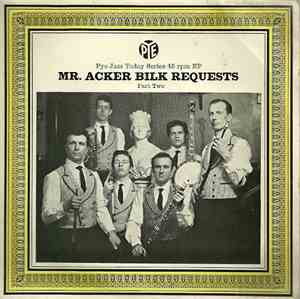
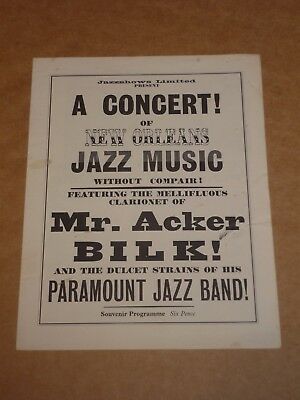
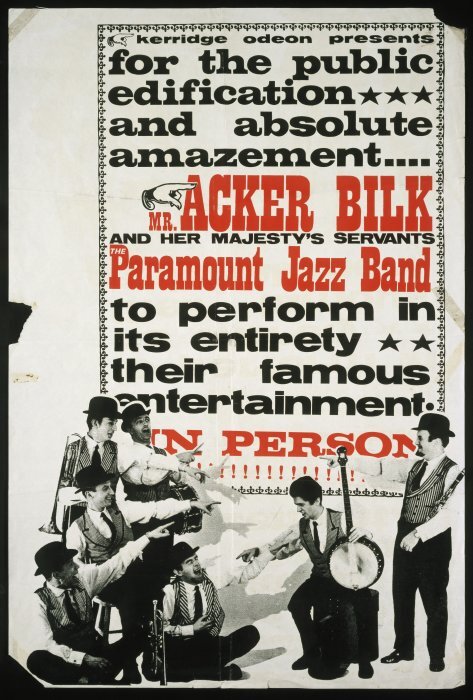
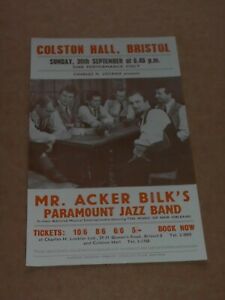 UPDATE 26th October 2021
UPDATE 26th October 2021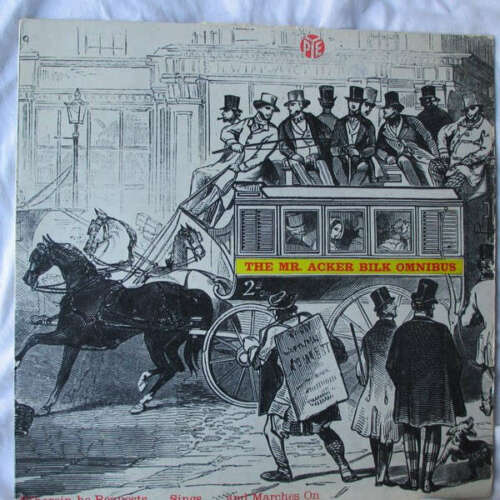
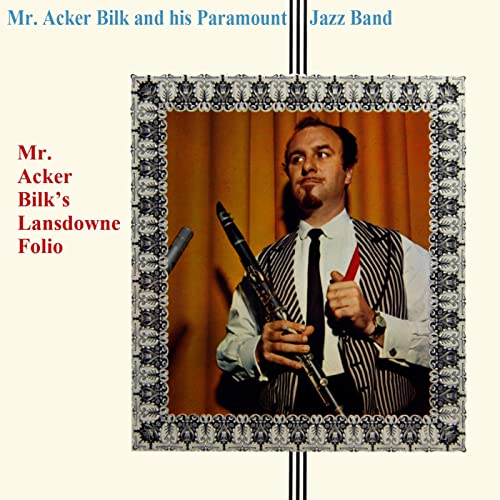
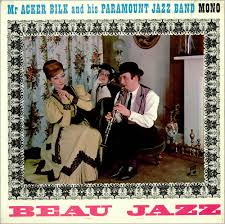
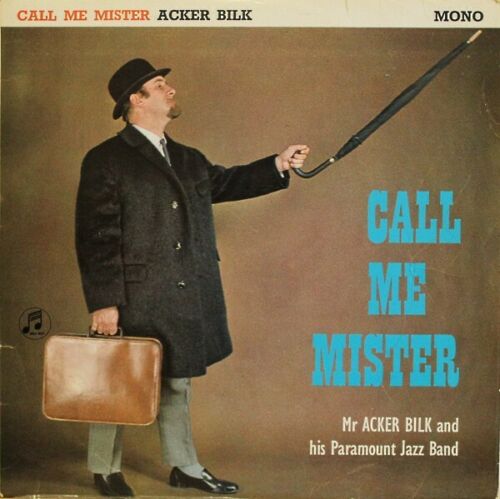
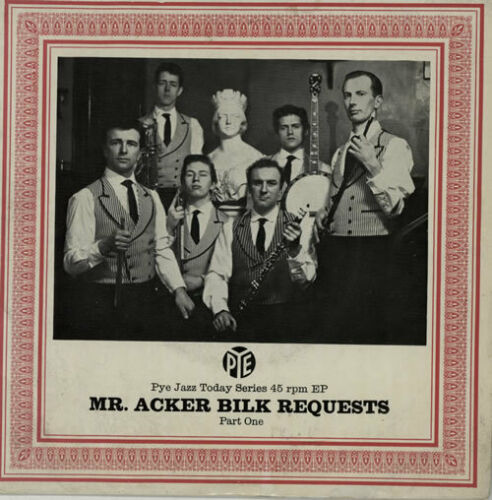
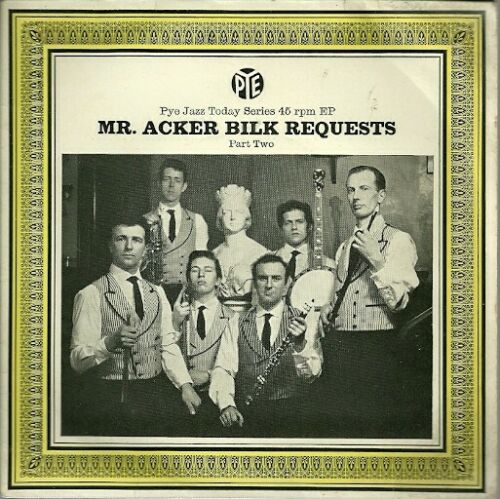
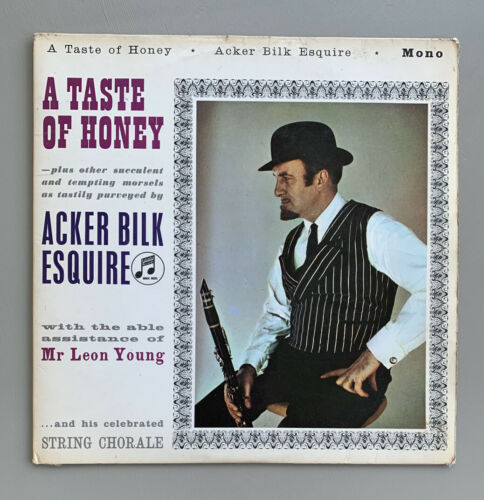
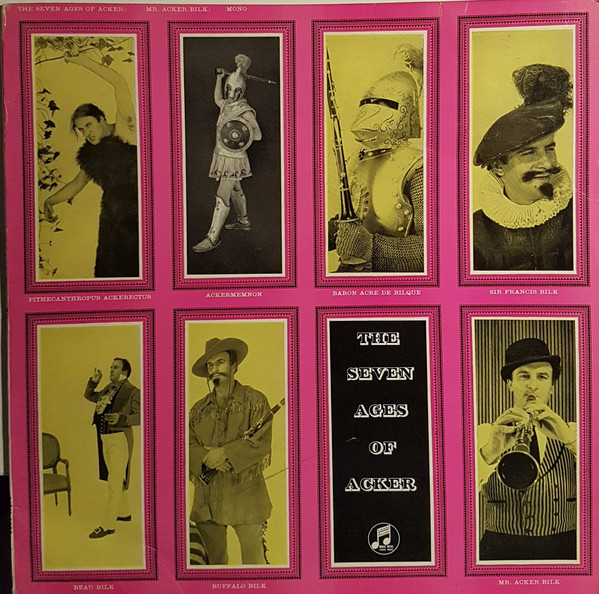
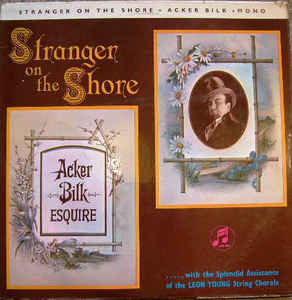 ACKER BILK ESQUIRE
accompanied by the LEON YOUNG String
chorale
ACKER BILK ESQUIRE
accompanied by the LEON YOUNG String
chorale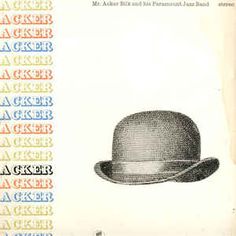 Yesterday, 4th April
2018, I found a
copy of this album, simply entitled “Acker” in the Sue Ryder shop in
Cromer, Norfolk, priced £2 – I had all of the albums in the 1960s, of
course, and this one dates from 1960. Here goes:
Yesterday, 4th April
2018, I found a
copy of this album, simply entitled “Acker” in the Sue Ryder shop in
Cromer, Norfolk, priced £2 – I had all of the albums in the 1960s, of
course, and this one dates from 1960. Here goes: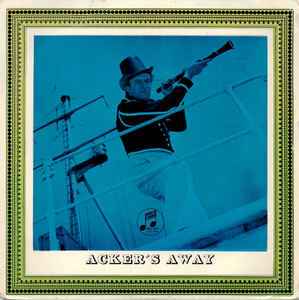
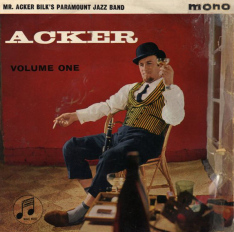 During my youth I
collected anything and everything I
could to do with Acker Bilk – it was the era when “trad jazz” ruled the
Hit Parade, and Acker Bilk had recently transferred from the Pye Jazz
label to EMI Records, and a new photographer, Patrick Gwynn-Jones had
been appointed, along with a publicist, Peter Leslie, who came up with
the idea of dressing the Paramount Jazz Band in smart, fancy waistcoats
and bowler hats. Overnight, the sleeve notes became something quite
extraordinary – while most EPs and LPs simply carried the track listing
– two tracks on side A, two on side B of an EP, for example, now
Acker’s EPS and LPs carried long, beautifully written essays. I have
searched the web for many years trying to find examples of Peter
Leslie’s writing, and the only pertinent reference that I can find is
my own review of The Book of Bilk, a collection of essays by Leslie
featuring various characters from history, like Johann Sebastian Bilk,
Pithecus Ackerectus etc., etc. It is a work of genius, the work of a
genius, and it is important that these sleeve notes should be available
to read on the web, which is why I have started to collect Acker’s EPs
and LPs, the first of which you see above. I don’t have a record player
to play them on, but they are things of beauty, and of great joy, as
you will discover. Below are the sleeve notes for Acker Volume One, the
track listing of which is as follows:
During my youth I
collected anything and everything I
could to do with Acker Bilk – it was the era when “trad jazz” ruled the
Hit Parade, and Acker Bilk had recently transferred from the Pye Jazz
label to EMI Records, and a new photographer, Patrick Gwynn-Jones had
been appointed, along with a publicist, Peter Leslie, who came up with
the idea of dressing the Paramount Jazz Band in smart, fancy waistcoats
and bowler hats. Overnight, the sleeve notes became something quite
extraordinary – while most EPs and LPs simply carried the track listing
– two tracks on side A, two on side B of an EP, for example, now
Acker’s EPS and LPs carried long, beautifully written essays. I have
searched the web for many years trying to find examples of Peter
Leslie’s writing, and the only pertinent reference that I can find is
my own review of The Book of Bilk, a collection of essays by Leslie
featuring various characters from history, like Johann Sebastian Bilk,
Pithecus Ackerectus etc., etc. It is a work of genius, the work of a
genius, and it is important that these sleeve notes should be available
to read on the web, which is why I have started to collect Acker’s EPs
and LPs, the first of which you see above. I don’t have a record player
to play them on, but they are things of beauty, and of great joy, as
you will discover. Below are the sleeve notes for Acker Volume One, the
track listing of which is as follows: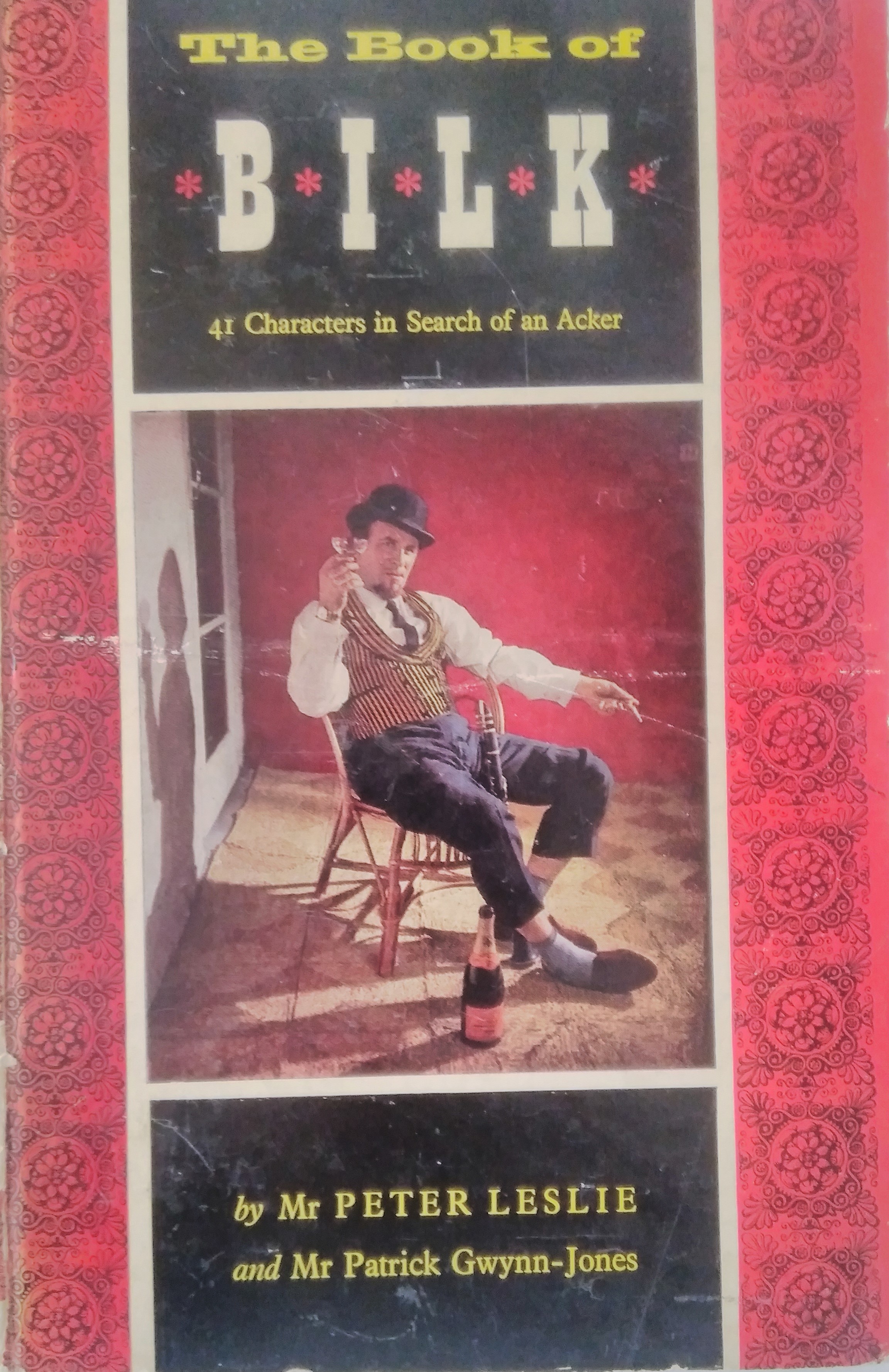 This
is a must for Acker Bilk fans. It was published in 1961 and written by
Peter Leslie with photography by Patrick Gwynne-Jones, the photos
showing Acker dressed as each of the 41 characters created by Leslie,
including John Osbilk, the Ackery Young Man, Kemal Ackerturk,
Ackerangelo etc., etc. Peter Leslie's Regency style is there on every
page, and this book is now a collectors' item. There are no decent
photographs available of it on the web, so I've taken one of my copy on
my phone and it's shown here, on the right, in all its glory. The book
coincided with the
release of Acker's album The Seven Ages of Acker, which includes some
of the characters from the Book of Bilk. Like all of Peter's sleeve
notes this is a work of utter genius, and copies, being hard to come
by, should be treasured. The whole publicity machine surrounding Acker
and his music was something quite unique and very entertaining, which,
to be fair, the vast majority of vinyl albums weren't then, until ELO's
Out of the Blue, and certainly aren't now!
This
is a must for Acker Bilk fans. It was published in 1961 and written by
Peter Leslie with photography by Patrick Gwynne-Jones, the photos
showing Acker dressed as each of the 41 characters created by Leslie,
including John Osbilk, the Ackery Young Man, Kemal Ackerturk,
Ackerangelo etc., etc. Peter Leslie's Regency style is there on every
page, and this book is now a collectors' item. There are no decent
photographs available of it on the web, so I've taken one of my copy on
my phone and it's shown here, on the right, in all its glory. The book
coincided with the
release of Acker's album The Seven Ages of Acker, which includes some
of the characters from the Book of Bilk. Like all of Peter's sleeve
notes this is a work of utter genius, and copies, being hard to come
by, should be treasured. The whole publicity machine surrounding Acker
and his music was something quite unique and very entertaining, which,
to be fair, the vast majority of vinyl albums weren't then, until ELO's
Out of the Blue, and certainly aren't now!